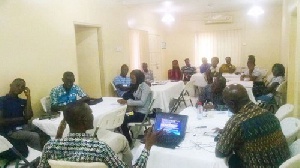 Mr. Zakaria Tanko urged journalists must act professionally in accordance with the law and ethics
Mr. Zakaria Tanko urged journalists must act professionally in accordance with the law and ethics
Mr. Zakaria Tanko, a lawyer and Head of the Print Journalism Department of the Ghana Institute of Journalism (GIJ) has urged journalists to strike a balance between their duty to expose wrongdoing and responsible and professional reporting.
He said that even though journalists have a duty to expose wrongdoing, which leads to damaging the reputations of persons or institutions they expose for wrongdoing, they must ensure that they act professionally in accordance with the law and ethics of their profession at all times.
Speaking at a two-day seminar on investigative journalism in Accra, Mr. Tanko explained that in recognition of the important role that the media play in democratic governance, the framers of the 1992 Constitution of Ghana empowered the media in Chapter 12 of the 1992 Constitution of Ghana to hold duty bearers accountable to the public.
He, however, urged journalists to know the distinction between what may be in the public interest and what may interest the public in order to carry out their duties professionally.
The seminar, which was organized by research and education think tank, Africa Centre for International Law and Accountability (ACILA) and was attended by about 30 participants from mainstream media and media training institutions, was on the theme “The Theory and Practice of Investigative Journalism: From a Story Idea to Investigation, Expose, Follow-Up, Impact and Causing Change.”
The seminar featured formal lectures by journalism professors and resource persons along with case studies by award winning and practicing investigative journalists from JOYFM and Metro TV.
One of the resource persons, Ms. Esther Armah, an award-winning international journalist urged journalists to take initiative and not to wait for an invitation if they want to publish or broadcast groundbreaking stories.
She explained that the need to take initiative is very important especially as competition continues to be fierce in the practice of contemporary journalism. She spoke on the topic “Challenges and Choices: from London to US to Africa and the Burden of Balance vs. Opportunity.”
Another resource person, Mr. William Nyarko, Executive Director of ACILA who took participants through how to get a story idea, investigate, and publish for impact and change, outlined eight steps. These were getting the story idea; forming a hypothesis; developing a plan; estimating a budget; conducting the investigation; writing the story; publishing/broadcasting the report and monitoring reactions; and following up on the stories for impact and change.
Touching on one of the key objectives of the seminar, he said that the seminar was to equip participants with knowledge and skills of investigative journalism to enable investigative journalists to hold duty bearers accountable, a duty which every Ghanaian citizen is constitutionally mandated to do.
He added that ACILA will continue to liaise with other bodies to deliver on its core duty, one of which is to provide capacity building to citizens to engender demand for accountable government and promote democratic governance in Ghana and Africa.
Other resource persons were Dr. Etse Sikanku, Lecturer of Communications, Ghana Institute of Journalism and Mr. Jonathan Osei-Owusu, Executive Director, POS Foundation.
Award-winning practicing investigative journalists, Mr. Kwetey Nartey of JOYFM/Multimedia Group Limited and Mr. Gabriel Obodai Torgbor-Ashong, Metro TV also addressed participants and shared live lessons from the field.
According to the participants, they were equipped with knowledge and skills from the seminar to enable them to provide accurate and reliable information to the public to foster quality citizen participation in Ghana’s democratic governance and engender demand for responsiveness and accountability from duty bearers.